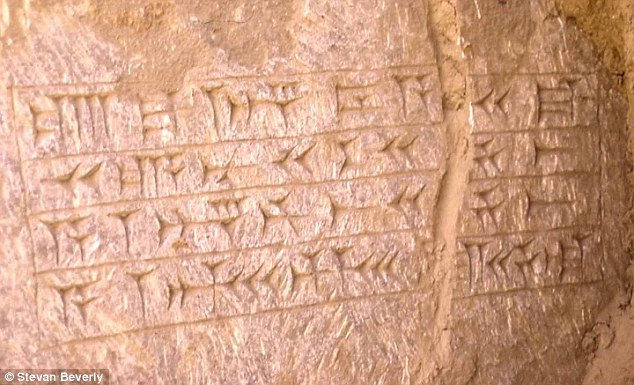
ISIS’ destruction of the biblical tomb of Jonah has revealed a once opulent palace and inscriptions detailing the life of an Assyrian King.
Seven clay tablets, found in a palace hidden under the Tomb of Jonah in the northern city of Mosul, describe the rule of a king named Esarhaddon.
The inscriptions describe Esarhaddon as ‘king of the world’, and claim he rebuilt the ancient cities of Babylon and Esagil during his reign.
They also lay out the man’s family history, giving scientists fresh insight into the ancient royal bloodline of Assyria.
The tablets were found in four tunnels dug by ISIS looters looking for Assyrian treasure beneath the Tomb of Jonah, a shrine sacred to both Christians and Muslims.
The site was blown up by the terror group during its occupation of Mosul from June 2014 until January 2017, when the city was retaken by Iraqi forces.
Archaeologists picking through ancient rubble left behind by the group found a previously undiscovered palace containing white marble murals of bulls, stone statues of demi-goddesses and seven marble inscriptions.
New translations of the cuneiform tablets, thought to date back to the Assyrian empire in 672BC, show the texts describe King Esarhaddon.
One inscription, in translation, reads: ‘The palace of Esarhaddon, strong king, king of the world, king of Assyria, governor of Babylon, king of Sumer and Akkad, king of the kings of lower Egypt, upper Egypt and Kush [an ancient kingdom located south of Egypt]’, according to a new report from Live Science.
Previous research has found that Kush rulers once ruled Egypt, and the Niveneh inscriptions claim Esarhaddon defeated Kush leaders and chose new rulers to govern Egypt.
RELATED ARTICLES
- Iran Bombs Targets in Syria and Iraq as retaliation for Kerman Attack
- Brussels 'Allahu Akbar' shooter who targeted Swedes shot dead by police
- UK Discovers 'Underage' Boat Migrant Actually 42-Year-Old ISIS Operative
- Canadian leftists go out of their way to defend Muslim terrorist
- ISIS was Behind the Russian Embassy Attack in Kabul, Afghanistan











